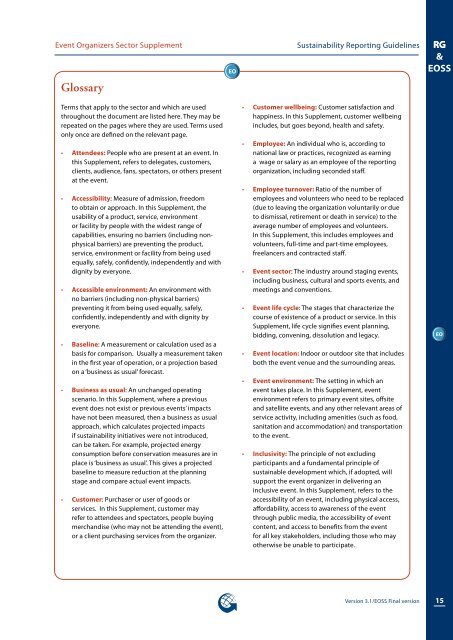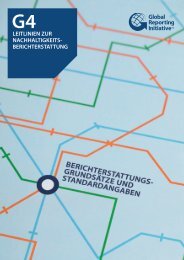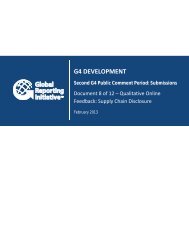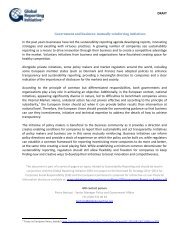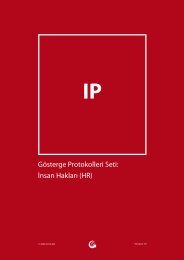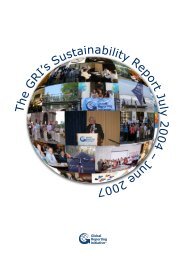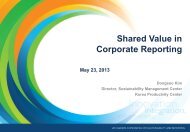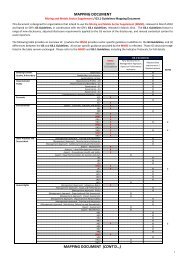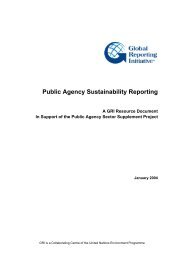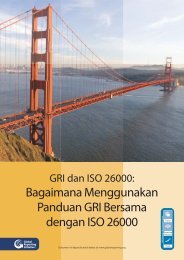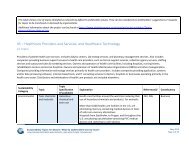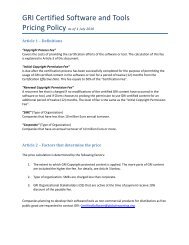Event Organizers Sector Supplement - Global Reporting Initiative
Event Organizers Sector Supplement - Global Reporting Initiative
Event Organizers Sector Supplement - Global Reporting Initiative
You also want an ePaper? Increase the reach of your titles
YUMPU automatically turns print PDFs into web optimized ePapers that Google loves.
<strong>Event</strong> <strong>Organizers</strong> <strong>Sector</strong> <strong>Supplement</strong><br />
EO<br />
Sustainability <strong>Reporting</strong> Guidelines<br />
RG<br />
&<br />
EOSS<br />
Glossary<br />
Terms that apply to the sector and which are used<br />
throughout the document are listed here. They may be<br />
repeated on the pages where they are used. Terms used<br />
only once are defined on the relevant page.<br />
• Attendees: People who are present at an event. In<br />
this <strong>Supplement</strong>, refers to delegates, customers,<br />
clients, audience, fans, spectators, or others present<br />
at the event.<br />
• Accessibility: Measure of admission, freedom<br />
to obtain or approach. In this <strong>Supplement</strong>, the<br />
usability of a product, service, environment<br />
or facility by people with the widest range of<br />
capabilities, ensuring no barriers (including nonphysical<br />
barriers) are preventing the product,<br />
service, environment or facility from being used<br />
equally, safely, confidently, independently and with<br />
dignity by everyone.<br />
• Accessible environment: An environment with<br />
no barriers (including non-physical barriers)<br />
preventing it from being used equally, safely,<br />
confidently, independently and with dignity by<br />
everyone.<br />
• Baseline: A measurement or calculation used as a<br />
basis for comparison. Usually a measurement taken<br />
in the first year of operation, or a projection based<br />
on a ‘business as usual’ forecast.<br />
• Business as usual: An unchanged operating<br />
scenario. In this <strong>Supplement</strong>, where a previous<br />
event does not exist or previous events’ impacts<br />
have not been measured, then a business as usual<br />
approach, which calculates projected impacts<br />
if sustainability initiatives were not introduced,<br />
can be taken. For example, projected energy<br />
consumption before conservation measures are in<br />
place is ‘business as usual’. This gives a projected<br />
baseline to measure reduction at the planning<br />
stage and compare actual event impacts.<br />
• Customer: Purchaser or user of goods or<br />
services. In this <strong>Supplement</strong>, customer may<br />
refer to attendees and spectators, people buying<br />
merchandise (who may not be attending the event),<br />
or a client purchasing services from the organizer.<br />
• Customer wellbeing: Customer satisfaction and<br />
happiness. In this <strong>Supplement</strong>, customer wellbeing<br />
includes, but goes beyond, health and safety.<br />
• Employee: An individual who is, according to<br />
national law or practices, recognized as earning<br />
a wage or salary as an employee of the reporting<br />
organization, including seconded staff.<br />
• Employee turnover: Ratio of the number of<br />
employees and volunteers who need to be replaced<br />
(due to leaving the organization voluntarily or due<br />
to dismissal, retirement or death in service) to the<br />
average number of employees and volunteers.<br />
In this <strong>Supplement</strong>, this includes employees and<br />
volunteers, full-time and part-time employees,<br />
freelancers and contracted staff.<br />
• <strong>Event</strong> sector: The industry around staging events,<br />
including business, cultural and sports events, and<br />
meetings and conventions.<br />
• <strong>Event</strong> life cycle: The stages that characterize the<br />
course of existence of a product or service. In this<br />
<strong>Supplement</strong>, life cycle signifies event planning,<br />
bidding, convening, dissolution and legacy.<br />
• <strong>Event</strong> location: Indoor or outdoor site that includes<br />
both the event venue and the surrounding areas.<br />
• <strong>Event</strong> environment: The setting in which an<br />
event takes place. In this <strong>Supplement</strong>, event<br />
environment refers to primary event sites, offsite<br />
and satellite events, and any other relevant areas of<br />
service activity, including amenities (such as food,<br />
sanitation and accommodation) and transportation<br />
to the event.<br />
• Inclusivity: The principle of not excluding<br />
participants and a fundamental principle of<br />
sustainable development which, if adopted, will<br />
support the event organizer in delivering an<br />
inclusive event. In this <strong>Supplement</strong>, refers to the<br />
accessibility of an event, including physical access,<br />
affordability, access to awareness of the event<br />
through public media, the accessibility of event<br />
content, and access to benefits from the event<br />
for all key stakeholders, including those who may<br />
otherwise be unable to participate.<br />
EO<br />
Version 3.1/EOSS Final version<br />
15


